简单句和复合句之间的转换 1
- 格式:docx
- 大小:20.86 KB
- 文档页数:4
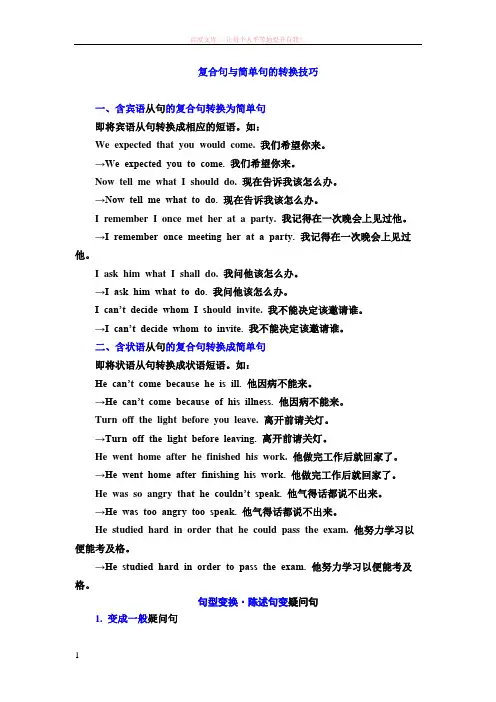
复合句与简单句的转换技巧一、含宾语从句的复合句转换为简单句即将宾语从句转换成相应的短语。
如:We expected that you would come. 我们希望你来。
→We expected you to come. 我们希望你来。
Now tell me what I should do. 现在告诉我该怎么办。
→Now tell me what to do. 现在告诉我该怎么办。
I remember I once met her at a party. 我记得在一次晚会上见过他。
→I remember once meeting her at a party. 我记得在一次晚会上见过他。
I ask him what I shall do. 我问他该怎么办。
→I ask him what to do. 我问他该怎么办。
I can’t decide whom I sh ould invite. 我不能决定该邀请谁。
→I can’t decide whom to invite. 我不能决定该邀请谁。
二、含状语从句的复合句转换成简单句即将状语从句转换成状语短语。
如:He can’t come because he is ill. 他因病不能来。
→He can’t come because of his illness. 他因病不能来。
Turn off the light before you leave. 离开前请关灯。
→Turn off the light before leaving. 离开前请关灯。
He went home after he finished his work. 他做完工作后就回家了。
→He went home after finishing his work. 他做完工作后就回家了。
He was so angry th at he couldn’t speak. 他气得话都说不出来。

复合句与简单句的转换技巧Revised as of 23 November 2020复合句与简单句的转换技巧?一、含宾语的复合句转换为简单句即将宾语转换成相应的短语。
如:We expected that you would come. 我们希望你来。
→We expected you to come. 我们希望你来。
Now tell me what I should do. 现在告诉我该怎么办。
→Now tell me what to do. 现在告诉我该怎么办。
I remember I once met her at a party. 我记得在一次晚会上见过他。
→I remember once meeting her at a party. 我记得在一次晚会上见过他。
I ask him what I shall do. 我问他该怎么办。
→I ask him what to do. 我问他该怎么办。
I can’t decide whom I should invit e. 我不能决定该邀请谁。
→I can’t decide whom to invite. 我不能决定该邀请谁。
二、含状语的复合句转换成简单句即将状语转换成状语短语。
如:He can’t come because he is ill. 他因病不能来。
→He can’t come because of his illness. 他因病不能来。
Turn off the light before you leave. 离开前请关灯。
→Turn off the light before leaving. 离开前请关灯。
He went home after he finished his work. 他做完工作后就回家了。
→He went home after finishing his work. 他做完工作后就回家了。
He was so angry that he couldn’t speak. 他气得话都说不出来。
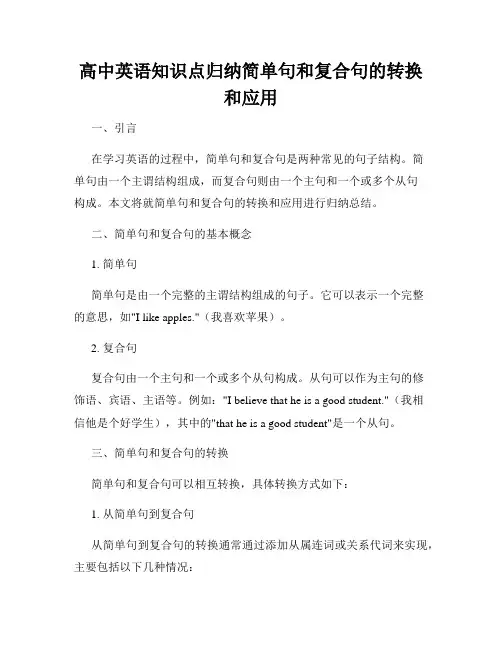
高中英语知识点归纳简单句和复合句的转换和应用一、引言在学习英语的过程中,简单句和复合句是两种常见的句子结构。
简单句由一个主谓结构组成,而复合句则由一个主句和一个或多个从句构成。
本文将就简单句和复合句的转换和应用进行归纳总结。
二、简单句和复合句的基本概念1. 简单句简单句是由一个完整的主谓结构组成的句子。
它可以表示一个完整的意思,如"I like apples."(我喜欢苹果)。
2. 复合句复合句由一个主句和一个或多个从句构成。
从句可以作为主句的修饰语、宾语、主语等。
例如:"I believe that he is a good student."(我相信他是个好学生),其中的"that he is a good student"是一个从句。
三、简单句和复合句的转换简单句和复合句可以相互转换,具体转换方式如下:1. 从简单句到复合句从简单句到复合句的转换通常通过添加从属连词或关系代词来实现,主要包括以下几种情况:(1)添加从属连词:"I know he is a doctor."(我知道他是个医生)可以转换为"I know that he is a doctor."(我知道他是个医生)。
在这个例子中,从属连词"that"连接了主句和从句。
(2)添加关系代词:"She has a brother. He is a teacher."(她有一个兄弟,他是个教师)可以转换为"She has a brother who is a teacher."(她有一个兄弟,他是个教师)。
在这个例子中,关系代词"who"引导了从句。
2. 从复合句到简单句从复合句到简单句的转换通常通过删除从句的方式实现,主要包括以下几种情况:(1)删除从属连词:"I think that he is right."(我认为他是对的)可以转换为"I think he is right."(我认为他是对的)。
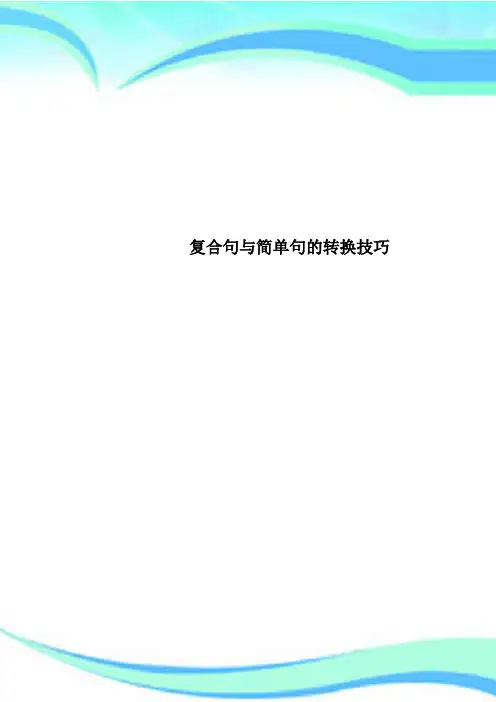
复合句与简单句的转换技巧————————————————————————————————作者:————————————————————————————————日期:复合句与简单句的转换技巧一、含宾语从句的复合句转换为简单句即将宾语从句转换成相应的短语。
如:We expected thatyou would come.我们希望你来。
→Weexpected you to come. 我们希望你来。
Now tellme what Ishould do. 现在告诉我该怎么办。
→Now tell me what todo.现在告诉我该怎么办。
I remember I once met her ata party.我记得在一次晚会上见过他。
→Iremember once meetingher ataparty. 我记得在一次晚会上见过他。
I ask himwhat I shall do. 我问他该怎么办。
→I ask him whatto do.我问他该怎么办。
I can’tdecide whom I should invite.我不能决定该邀请谁。
→Ican’t decide whomtoinvite.我不能决定该邀请谁。
二、含状语从句的复合句转换成简单句即将状语从句转换成状语短语。
如:He can’tcome becauseheis ill. 他因病不能来。
→He can’tcome because of hisillness. 他因病不能来。
Turn off the light before you leave.离开前请关灯。
→Turn off thelightbefore leaving. 离开前请关灯。
He went home afterhefinished his work.他做完工作后就回家了。
→Hewenthomeafter finishing his work. 他做完工作后就回家了。
He wasso angry thathecouldn’t speak.他气得话都说不出来。
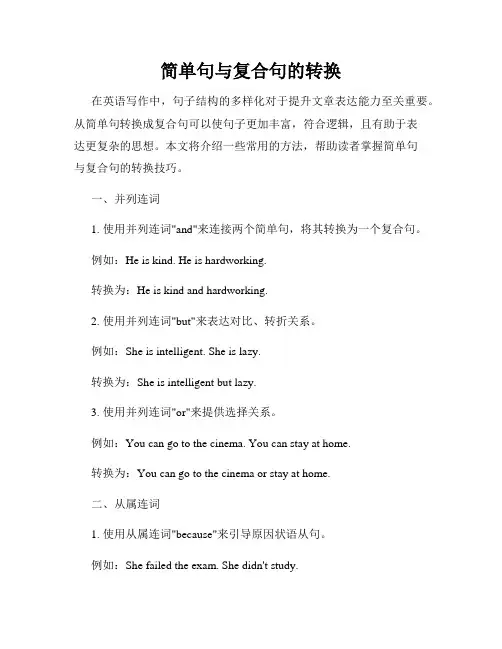
简单句与复合句的转换在英语写作中,句子结构的多样化对于提升文章表达能力至关重要。
从简单句转换成复合句可以使句子更加丰富,符合逻辑,且有助于表达更复杂的思想。
本文将介绍一些常用的方法,帮助读者掌握简单句与复合句的转换技巧。
一、并列连词1. 使用并列连词"and"来连接两个简单句,将其转换为一个复合句。
例如:He is kind. He is hardworking.转换为:He is kind and hardworking.2. 使用并列连词"but"来表达对比、转折关系。
例如:She is intelligent. She is lazy.转换为:She is intelligent but lazy.3. 使用并列连词"or"来提供选择关系。
例如:You can go to the cinema. You can stay at home.转换为:You can go to the cinema or stay at home.二、从属连词1. 使用从属连词"because"来引导原因状语从句。
例如:She failed the exam. She didn't study.转换为:She failed the exam because she didn't study.2. 使用从属连词"if"来引导条件状语从句。
例如:He will come. It doesn't rain.转换为:He will come if it doesn't rain.3. 使用从属连词"when"来引导时间状语从句。
例如:I will call you. I finish my work.转换为:I will call you when I finish my work.三、使用关系代词1. 使用关系代词"who"、"which"和"that"引导定语从句。
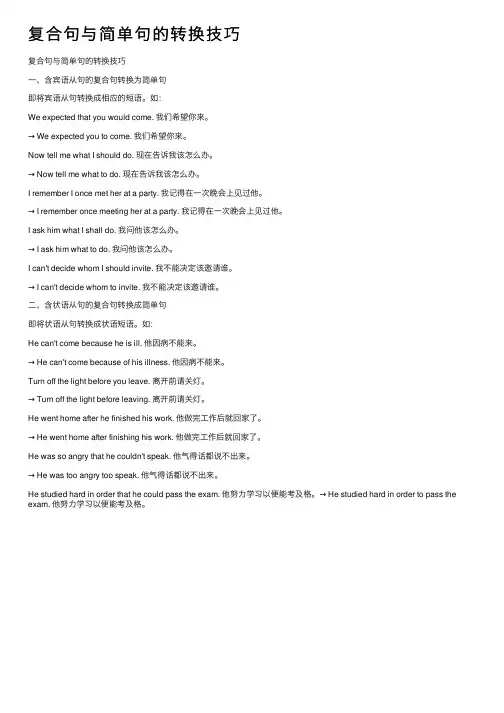
复合句与简单句的转换技巧复合句与简单句的转换技巧⼀、含宾语从句的复合句转换为简单句即将宾语从句转换成相应的短语。
如:We expected that you would come. 我们希望你来。
→ We expected you to come. 我们希望你来。
Now tell me what I should do. 现在告诉我该怎么办。
→ Now tell me what to do. 现在告诉我该怎么办。
I remember I once met her at a party. 我记得在⼀次晚会上见过他。
→ I remember once meeting her at a party. 我记得在⼀次晚会上见过他。
I ask him what I shall do. 我问他该怎么办。
→ I ask him what to do. 我问他该怎么办。
I can't decide whom I should invite. 我不能决定该邀请谁。
→ I can't decide whom to invite. 我不能决定该邀请谁。
⼆、含状语从句的复合句转换成简单句即将状语从句转换成状语短语。
如:He can't come because he is ill. 他因病不能来。
→ He can't come because of his illness. 他因病不能来。
Turn off the light before you leave. 离开前请关灯。
→ Turn off the light before leaving. 离开前请关灯。
He went home after he finished his work. 他做完⼯作后就回家了。
→ He went home after finishing his work. 他做完⼯作后就回家了。
He was so angry that he couldn't speak. 他⽓得话都说不出来。
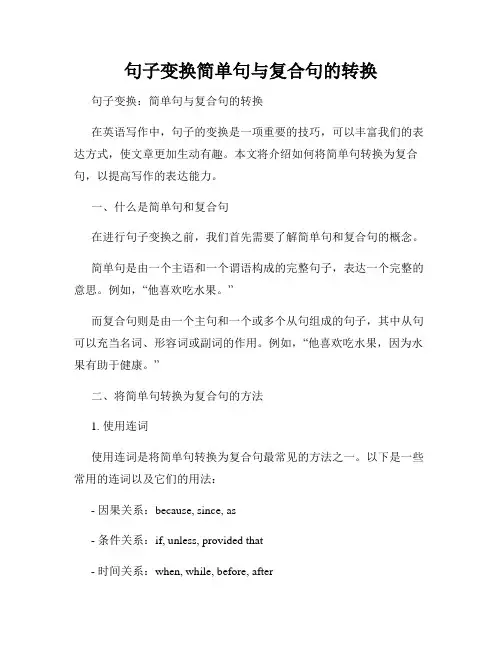
句子变换简单句与复合句的转换句子变换:简单句与复合句的转换在英语写作中,句子的变换是一项重要的技巧,可以丰富我们的表达方式,使文章更加生动有趣。
本文将介绍如何将简单句转换为复合句,以提高写作的表达能力。
一、什么是简单句和复合句在进行句子变换之前,我们首先需要了解简单句和复合句的概念。
简单句是由一个主语和一个谓语构成的完整句子,表达一个完整的意思。
例如,“他喜欢吃水果。
”而复合句则是由一个主句和一个或多个从句组成的句子,其中从句可以充当名词、形容词或副词的作用。
例如,“他喜欢吃水果,因为水果有助于健康。
”二、将简单句转换为复合句的方法1. 使用连词使用连词是将简单句转换为复合句最常见的方法之一。
以下是一些常用的连词以及它们的用法:- 因果关系:because, since, as- 条件关系:if, unless, provided that- 时间关系:when, while, before, after- 递进关系:and, also, besides- 转折关系:but, however, although通过使用这些连词,我们可以将简单句变换为复合句,使句子更加丰富多样。
例如,将简单句“他喜欢吃水果。
”转换为复合句可以使用连词“because”:因为水果有助于健康,所以他喜欢吃水果。
2. 使用关系代词除了使用连词外,我们还可以使用关系代词来将简单句转换为复合句。
以下是一些常用的关系代词:- who:指人的主格- whom:指人的宾格- whose:指人的所有格- which:指物- that:可以指人或物通过使用关系代词,我们将主句和从句连接在一起,形成一个复合句。
例如,将简单句“这是我买的书。
”转换为复合句可以使用关系代词“which”:这是我买的书,它非常有趣。
3. 使用其他从句引导词除了连词和关系代词之外,我们还可以使用其他从句引导词来将简单句转换为复合句。
以下是一些常用的从句引导词:- if:引导条件从句- when:引导时间从句- where:引导地点从句- whether:引导选择从句通过使用这些从句引导词,我们可以将简单句转换为复合句,使句子更加复杂多样。
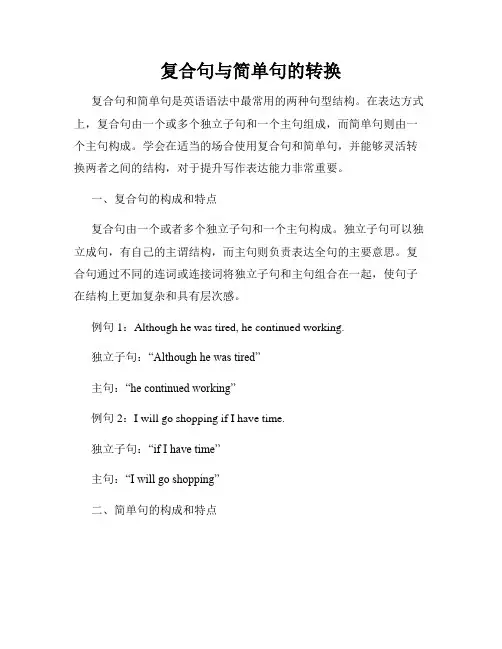
复合句与简单句的转换复合句和简单句是英语语法中最常用的两种句型结构。
在表达方式上,复合句由一个或多个独立子句和一个主句组成,而简单句则由一个主句构成。
学会在适当的场合使用复合句和简单句,并能够灵活转换两者之间的结构,对于提升写作表达能力非常重要。
一、复合句的构成和特点复合句由一个或者多个独立子句和一个主句构成。
独立子句可以独立成句,有自己的主谓结构,而主句则负责表达全句的主要意思。
复合句通过不同的连词或连接词将独立子句和主句组合在一起,使句子在结构上更加复杂和具有层次感。
例句1:Although he was tired, he continued working.独立子句:“Although he was tired”主句:“he continued working”例句2:I will go shopping if I have time.独立子句:“if I have time”主句:“I will go shopping”二、简单句的构成和特点简单句由一个主句构成,主句包含一个主语和一个谓语,能够独立表达一个完整的意思。
简单句常用于陈述事实、表达观点或给出简洁的命令。
简单句的结构相对简单,语义直接明了,容易理解和使用。
例句1:She plays the piano.主句:“She plays the piano.”例句2:The sun is shining.主句:“The sun is shining.”三、复合句转换为简单句有时候,我们在表达时会使用过多的复合句,在简化语言表达时可以将复合句转换为简单句,让句子的结构更加简洁。
在转换过程中,通常可以利用一些关联词或者连接词。
例句1(复合句):Although she was exhausted, she still managed to finish the project.转换为简单句:She was exhausted but still managed to finish the project.例句2(复合句):Because it was raining heavily, we decided to stay indoors.转换为简单句:It was raining heavily so we decided to stay indoors.四、简单句转换为复合句有时候,为了在表达中增加一些信息或者给出原因和结果,我们可以将简单句转换为复合句。
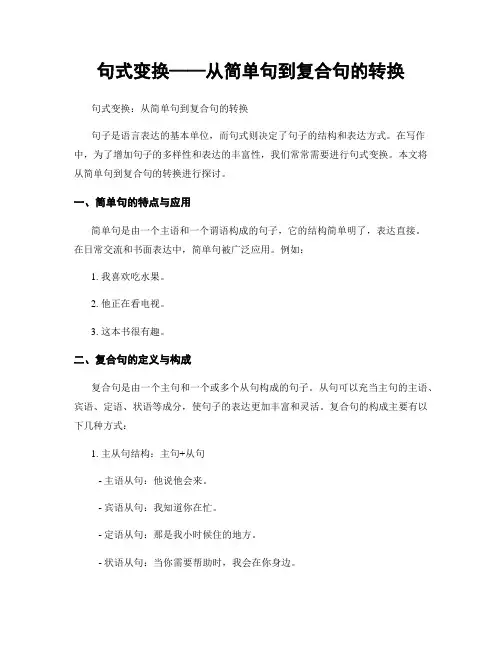
句式变换——从简单句到复合句的转换句式变换:从简单句到复合句的转换句子是语言表达的基本单位,而句式则决定了句子的结构和表达方式。
在写作中,为了增加句子的多样性和表达的丰富性,我们常常需要进行句式变换。
本文将从简单句到复合句的转换进行探讨。
一、简单句的特点与应用简单句是由一个主语和一个谓语构成的句子,它的结构简单明了,表达直接。
在日常交流和书面表达中,简单句被广泛应用。
例如:1. 我喜欢吃水果。
2. 他正在看电视。
3. 这本书很有趣。
二、复合句的定义与构成复合句是由一个主句和一个或多个从句构成的句子。
从句可以充当主句的主语、宾语、定语、状语等成分,使句子的表达更加丰富和灵活。
复合句的构成主要有以下几种方式:1. 主从句结构:主句+从句- 主语从句:他说他会来。
- 宾语从句:我知道你在忙。
- 定语从句:那是我小时候住的地方。
- 状语从句:当你需要帮助时,我会在你身边。
2. 并列句结构:句子1+连词+句子2- 并列主语:他和我一起去了公园。
- 并列谓语:他唱歌跳舞,引来了一片掌声。
- 并列宾语:我喜欢吃水果和蔬菜。
- 并列状语:他既喜欢音乐,又喜欢运动。
三、简单句到复合句的转换技巧1. 主从句转换:将简单句中的某一部分改写为从句形式。
例如,将简单句“他喜欢吃水果。
”转换为宾语从句:“我知道他喜欢吃水果。
”这样就将原先的宾语“水果”改写为了宾语从句“他喜欢吃什么”。
2. 并列句转换:将简单句中的一个成分进行扩展,形成并列结构。
例如,将简单句“他喜欢音乐。
”转换为并列句:“他既喜欢音乐,又喜欢运动。
”这样就将原先的简单句扩展为了并列结构,表达了两个并列的动作。
3. 插入语转换:在简单句中加入一个从句或短语,使句子更具表达力。
例如,将简单句“这本书很有趣。
”转换为插入语结构:“这本书,我觉得很有趣。
”这样就在简单句中加入了一个从句,使句子更加生动。
四、句式变换的作用与意义句式变换可以使句子更加多样化,增加表达的灵活性。
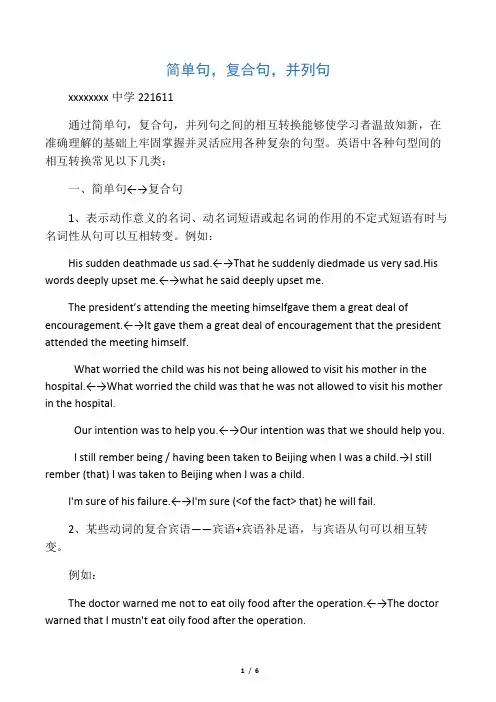
简单句,复合句,并列句xxxxxxxx中学221611通过简单句,复合句,并列句之间的相互转换能够使学习者温故知新,在准确理解的基础上牢固掌握并灵活应用各种复杂的句型。
英语中各种句型间的相互转换常见以下几类:一、简单句←→复合句1、表示动作意义的名词、动名词短语或起名词的作用的不定式短语有时与名词性从句可以互相转变。
例如:His sudden deathmade us sad.←→That he suddenly diedmade us very sad.His words deeply upset me.←→what he said deeply upset me.The president’s attending the meeting himselfgave them a great deal of encouragement.←→It gave them a great deal of encouragement that the pr esident attended the meeting himself.What worried the child was his not being allowed to visit his mother in the hospital.←→What worried the child was that he was not allowed to visit his mother in the hospital.Our intention was to help you.←→Our inten tion was that we should help you.I still rember being / having been taken to Beijing when I was a child.→I still rember (that) I was taken to Beijing when I was a child.I'm sure of his failure.←→I'm sure (<of the fact> that) he will fail.2、某些动词的复合宾语——宾语+宾语补足语,与宾语从句可以相互转变。
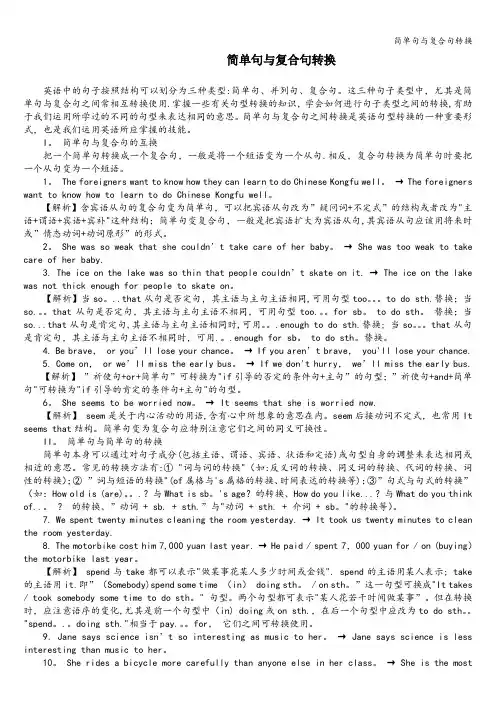
简单句与复合句转换英语中的句子按照结构可以划分为三种类型:简单句、并列句、复合句。
这三种句子类型中,尤其是简单句与复合句之间常相互转换使用.掌握一些有关句型转换的知识,学会如何进行句子类型之间的转换,有助于我们运用所学过的不同的句型来表达相同的意思。
简单句与复合句之间转换是英语句型转换的一种重要形式,也是我们运用英语所应掌握的技能。
I。
简单句与复合句的互换把一个简单句转换成一个复合句,一般是将一个短语变为一个从句.相反,复合句转换为简单句时要把一个从句变为一个短语。
1。
The foreigners want to know how they can learn to do Chinese Kongfu well。
→ The foreigners want to know how to learn to do Chinese Kongfu well。
【解析】含宾语从句的复合句变为简单句,可以把宾语从句改为”疑问词+不定式”的结构或者改为"主语+谓语+宾语+宾补"这种结构;简单句变复合句,一般是把宾语扩大为宾语从句,其宾语从句应该用将来时或”情态动词+动词原形”的形式。
2。
She was so weak that she couldn’t take care of her baby。
→ She was too weak to take care of her baby.3. The ice on the lake was so thin that people couldn’t skate on it. → The ice on the lake was not thick enough for people to skate on。
【解析】当so。
..that从句是否定句,其主语与主句主语相同,可用句型too。
to do sth.替换;当so.。
that从句是否定句,其主语与主句主语不相同,可用句型too.。
句式变换——从简单句到复合句的转换句子是语言表达的基本单位,它通过各种句式进行组合和变换,既能够使语言表达更加丰富多样,也能增强表达的准确性和逻辑性。
其中,从简单句到复合句的转换是比较常见和重要的句式变换方式。
本文将介绍如何进行这种句式变换,并通过具体的例子来说明。
一、从简单句到复合句——引入并列关系在句式变换中,最简单的方式就是引入并列关系,将两个或多个简单句通过并列连词连接起来,形成复合句。
下面是几个常用的并列连词:1. "而且"、“并且”、“而”、“又”:表示添加的关系例如:他不仅是一位优秀的演员,而且是一位杰出的导演。
2. "或者"、“或”、“还是”:表示选择的关系例如:她可以去看电影或者逛商场。
3. "但是"、“然而”、“可是”:表示转折的关系例如:我想去旅行,但是我没有足够的时间和金钱。
4. "因为"、“所以”、“由于”:表示原因和结果的关系例如:她努力学习,所以取得了优异的成绩。
二、从简单句到复合句——引入从属关系除了并列关系,我们还可以通过引入从属关系,将一个主句与一个或多个从句连接起来,形成复合句。
下面是几个常用的引导词:1. "如果"、“假如”、“倘若”:表示条件的关系例如:如果明天下雨,我们就不去郊游了。
2. "因为"、“由于”、“既然”:表示原因的关系例如:由于交通堵塞,他迟到了。
3. "当"、“因为”、“如果”:表示时间的关系例如:当他到达机场时,飞机已经起飞了。
4. "虽然"、“尽管”、“但是”:表示让步的关系例如:尽管很累,她还是坚持完成了任务。
通过引入从属关系,我们可以使句子更具复杂性和表达能力。
三、从简单句到复合句——引入其他关系除了并列关系和从属关系,我们还可以通过引入其他关系来进行句式变换,使句子更富有变化和表现力。
句子的简单句与复合句的转换句子是语言表达意思的基本单位,它可以通过简单句和复合句的形式来呈现。
简单句由一个主语和一个谓语构成,表达一个完整的意思。
而复合句则由一个主句和一个或多个从句构成,具备更为复杂的结构和更多的信息。
在日常生活和写作中,我们常常需要对句子进行转换,以使表达更加丰富多样。
下面将通过几个例子,来介绍一些简单句与复合句之间的转换方法。
例一:简单句转换为复合句简单句:他去了商店。
复合句:他去了商店,因为他需要买些东西。
在这个例子中,我们使用“因为”引导的原因状语从句来扩展了句子的信息量。
原本的简单句只表达了“他去了商店”的意思,而通过添加从句,我们介绍了他去商店的原因。
例二:简单句转换为复合句简单句:她喜欢读书。
复合句:她喜欢读书,这使她增长了知识。
在这个例子中,我们使用“这使”引导的结果状语从句来进一步扩展句子的信息。
原本的简单句只表达了“她喜欢读书”的意思,而通过添加从句,我们介绍了她读书的结果。
例三:简单句转换为复合句简单句:他跟朋友出去了。
复合句:他跟朋友出去了,然后他们一起去了电影院。
在这个例子中,我们使用“然后”引导的时间状语从句来进一步补充了句子的信息。
原本的简单句只表达了“他跟朋友出去了”的意思,而添加从句后,我们介绍了他们接下来做的事情。
通过以上的例子,我们可以看到简单句和复合句之间的转换方法。
简单句可以通过添加因果关系、结果或时间等从句来扩展,从而形成复合句结构。
这样的转换不仅丰富了句子的信息量,还使句子更加连贯有逻辑。
然而,在进行句子转换时,我们需要注意以下几点:首先,要确保从句与主句之间有明确的关系,避免出现信息重复或冗余。
从句应该是对主句的进一步解释或补充,使整个句子更加完整。
其次,需要合理使用从句引导词。
根据不同的转换目的,可以选择合适的引导词,如因果关系可使用“因为”、“所以”等,时间关系可使用“然后”、“接着”等。
最后,在使用复合句时,要注意语序和标点的准确运用,以确保句子的表达流畅和可读性。
小学语文句式转换归纳总结在学习语文的过程中,句式转换是培养学生语言表达能力的重要环节。
通过句式转换,可以帮助学生更好地理解句子的结构,提高语言思维的灵活性,丰富语言表达的方式。
以下是我对小学语文句式转换的归纳总结:一、主从复合句的句式转换1. 主从复合句转为简单句主从复合句可以通过主语加谓语的方式转换为简单句,即去掉从句中相应的主语和连接词。
例如:因为下雨,他没有去游泳。
转换为简单句:下雨了,他没有去游泳。
2. 主从复合句转为并列句主从复合句可以通过将从句中的主干提取出来并列起来的方式转换为并列句。
例如:我乘公交车回家,遇到了他。
转换为并列句:我乘公交车回家,我遇到了他。
3. 主从复合句转为独立结构主从复合句可以通过将从句中的主干提取出来形成独立的句子。
例如:他每天晚上做作业,直到很晚。
转换为独立结构:他每天晚上做作业。
直到很晚。
二、陈述句的句式转换1. 陈述句转为感叹句陈述句可以通过在句首添加感叹词或者助词“多”、“真”等来转换为感叹句。
例如:这只小猫很可爱。
转换为感叹句:多可爱的小猫啊!2. 陈述句转为疑问句陈述句可以通过改变语序或者在句末添加疑问词来转换为疑问句。
例如:他是个好人。
转换为疑问句:他是个好人吗?三、祈使句的句式转换1. 祈使句转为陈述句祈使句可以通过在句首添加“你”、“我”等人称代词并加上肯定或否定的助动词来转换为陈述句。
例如:请你帮我一个忙。
转换为陈述句:你可以帮我一个忙。
2. 祈使句转为感叹句祈使句可以通过在句首添加感叹词或者助词“多”、“真”等来转换为感叹句。
例如:不要做这样的事情。
转换为感叹句:真不要做这样的事情!以上是我对小学语文句式转换的归纳总结。
通过这些转换,学生可以更加灵活地运用句式,丰富语言表达方式,提高语文水平。
希望这些总结对于小学生的语文学习有所帮助。
简单句和复合句的转换句子是语言表达的基本单位,根据句子结构的复杂程度,句子可分为简单句和复合句。
简单句由一个主语和一个谓语构成,表达简单直接的意思;而复合句则由一个或多个简单句组成,通过连接词或从属词来表达更复杂的意思。
在写作中,灵活运用简单句和复合句的转换,可以使文章更加丰富有趣。
接下来,本文将探讨简单句和复合句之间的转换。
一、将简单句转换为复合句1. 添加连词通过添加连词,以增加句子的复杂性和信息量,将简单句转换为复合句。
例1:简单句我喜欢读书。
例2:复合句由于我喜欢读书,我经常去图书馆。
2. 引入从句通过引入从句,将简单句转换为复合句。
例3:简单句他喝水。
当他口渴的时候,他喝水。
3. 转换为条件句通过将简单句转换为条件句,可以表达更多的条件和假设。
例5:简单句他赢了比赛。
例6:复合句如果他赢了比赛,他将得到奖品。
二、将复合句转换为简单句1. 去除连接词通过去除复合句中的连接词,将复合句转换为简单句,使句子更加简洁明了。
例7:复合句因为天气太热,所以我没有去公园。
例8:简单句天气太热,我没有去公园。
2. 合并从句通过合并复合句中的从句,将复合句转换为简单句。
他学习很努力,因此他考试取得了好成绩。
例10:简单句他学习很努力,考试取得了好成绩。
总结:简单句和复合句是写作中常用的两种句子结构。
通过将简单句转换为复合句,我们可以更加详细地表达意思、丰富内容;而将复合句转换为简单句则可以使句子更加简洁明了。
在实际写作中,根据需要、语境和句子的整体结构,我们可以灵活运用简单句和复合句的转换,使文章更加生动有力,吸引读者的注意力。
以上就是简单句和复合句的转换的一些技巧和方法,希望对您的写作有所帮助。
通过合理运用这些转换方法,您可以更好地组织句子,使文章的表达更加丰富多样。
审稿:xxxx责编:xx句型转换是句子类别的转换,其目的在于检测学生运用各种句型的表达能力,才能在考试的评分中得到较高档次的分数。
这就要求学生对所学的句子结构和词形的变化做到概念清楚,懂得各种句型如何转换,运用准确,这有利于提高英语口语和书面表达能力。
简单句与复合句之间的互变很多复合句和简单句可以互变,意思上不发生太大的变化。
在很多情况下,是将复合句里的从句变为一个短语。
不论是主语从句、表语从句、宾语从句、定语从句还是状语从句,在一定的情况下都可以这样转换。
主语从句有时可以和短语互换,它既可以是不定式短语也可以是动名词短语。
(1) When and where we should hold the meeting is still to be discussed.→When and where to hold the meeting is still to be dis cussed.(2) It worried her a great deal that her son would stay up so late.→Her son’s staying up so late worried her a great deal.(3) What we had to do was to stand there,trying to catch the offender.→We had to stand there to catch the offender.表语从句有时可以和短语互换,与它互换的可以是不定式短语和动名词短语。
My idea is that we should do it right now.→My idea is to do it fight now.在某些动词的后面宾语从句可以和一个动名词短语或不定式短语互换.(1) I regret that I had told you the secret.→I regret telling you the secret.(3) They don’t know whether they shall carry out the old plan or not.→They don’t know whether to carry out the old plan or not.个别的同位语从句也可以和一个短语互换。
简单句和复合句的句型转换作者:张静来源:《读写算》2012年第34期简单句和复合句的转换,是英语句型转换的常见形式,对学生的能力要求较高。
它不但需要学生拥有扎实的语法知识,还要求他们掌握一些技能。
简单句和复合句的转换,是表达的需要,从语法的角度来看,其实是短语和从句的转换。
一个句子只包含一个主谓结构,若其成分用短语表示,这个句子则是简单句;若某一成分用从句表示,必然构成复合句。
简单句转换成复合句,一般是将一个短语变成一个从句;复合句变简单句,即把从句变为短语就可。
通常,可转换的成分有主语、表语、宾语、定语和状语。
一、宾语从句和短语等的转换1. 有些宾语从句可以转换为动词不定式短语、疑问词加不定式形式或不定式短语的复合宾语。
例如,①We decided that we would help him.We decided to help him.②I hate it when people are so selfish.I hate people to be so selfish③He is wondering where to find his lost car .He is wondering where he can find his lost car.④Jim found that it was difficult to learn Chinese well. →Jim found it difficult to learn Chinese well.2.有些宾语从句可以转换为动名词短语、或介词加动名词短语。
例如,①He admitted that he had broken the window.He admitted having broken the window.②She insisted that he should go with us.She insisted on going with us.3. 有些宾语从句可以转换为名词短语The poor girl doesn''t know when and where she was born. →The poor girl doesn''t know the time and the place of her birth.They demanded that their salary be raised.They demanded a rise in their salary.二、主语从句和短语的转换1. 有些主语从句可以转换为动名词短语或名词短语.例如,It worried his parents that he should mix with such people.His mixing with such people worried his parents.Parents'' love of children is perfect and minute.It''s perfect and minute that parents love children.2。
复合句和简单句的转换(一)
1. 用“宾语+宾补”来代替“宾语从句”。
例句: I found him very happy. 我发现他很快乐。
I found (that) he was very happy. 我发现他很快乐。
2. 用“疑问词+动词不定式”来代替“宾语从句”。
例句: I don't know what I will do tomorrow.
我不知道我明天会干什么。
I don't know what to do tomorrow.
我不知道明天千什么。
注意:why 是不能和不定式连用的。
“疑问词+动词不定式”来代替“宾语从句”这种简化的前提是宾语从句的主语和主句的主语相同,且主句的谓语动词通常是know, remember, forget ,learn 等。
3. 用“动词不定式”来代替一些结果状语从句或者目的状语从句。
例句:He must get up early so that he can catch the first bus.
他必须早起以便他能赶上第一班公交。
He must get up early to catch the first bus.
他必须早起以赶上第一班公交。
习题
1. I think ___ necessary to learn English well.
A. its
B. it
C. that
D. that is
2. You can’t have the horse _____ all the way. It’s too hot.
A. run
B. to run
C. runs
D. to be running
3. When I came back, I found the house _____ and everything _____.
A. was broken; took away
B. broken into; taken away
C. had been broken; taken
D. break into; take away
4. When I came back, I found nobody ___. It was empty.
A. on
B. out
C. in
D. away
5. Tell him _____ the window.
A. to shut not
B. not to shut
C. to not shut
D. not shut
6. ----The re’s a hole in your bag. ---- I know, I’m going to have it _____.
A. mend
B. mending
C. mended
D. to be mended
7. I found the door _____ when I got home.
A. opened
B. close
C. unlocking
D. open
8. There i sn’t any difference between the two. I really don’t know _________.
A. where to choose
B. which to choose
C. to choose what
D. to choose which
9. “ Have you d ecided when ________?” “ Yes, tomorrow morning.”
A. to leave
B. to be leaving
C. will you leave
D. are you leaving
10. ________, you need to try your best to practise.
A. Being a winner
B. To be a winner
C. Be a winner
D. Having been a winner
11. A car accident happened there. An old woman . But the car drove away.
A. knocked over
B. was knocked over
C. knocks over
D. is knocked
over
12. When I came in, I saw her the piano.
A. play
B. playing
C. played
D. to
play
13. The dog I saw just now is Mike’s.
A. who
B. that
C. when
D. where
14. His children work far away from here, and he has nobody to talk to all day long, so he often feels .
A. happy
B. lazy
C. tired
D.
lonely
15. —Do you know to go to Mount Tai by train with them?
—At 7 tomorrow morning.
A. where
B. how
C. why
D. when
1 The news (扩散) in the school yesterday.
2 The room is in a (乱七八糟). Clean it up now.
3 Don’t repeat what I’v e told you to anyone; it’s(私密的).
4 There are two (文件) on the table.
5 The road is too narrow for my car to go (通过).
6 My bike is a home (production).
7 —Is he coming tomorrow?
—I’m(sure), but you can ask himself.
8 It makes everything else go more (smooth)
9 They did not (proper) consider what would happen next.
10 This machine was (complete) out of
control.
11 You (fine) by the police if you break the traffic rules.
12 (limit) the number of cars is a useful way to reduce air pollution.
13Jack (dig) a hole in the garden when I went to see him.
14 How often the Olympic Games (take) place?
15 Do you know how much paper (waste) last year?。